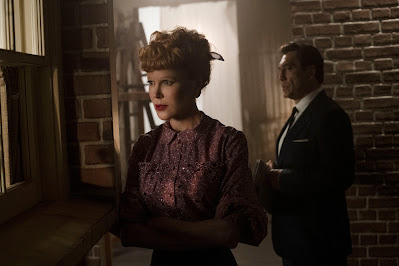As previously explained lamented in other posts, I got through my time in the Roman COVID hotel through year-end screeners. I watched a lot. And I watched some more when I returned, though my mind was still foggy (not that the fog has necessarily lifted). Writing reviews of all these, it just feels like too much, except perhaps in special circumstances. But I did jot down notes at the end of each viewing to preserve my initial reaction and mindset, at least, and so will, as writer brain fog permits, type up some drivel on those movies in capsule form. We continue our catch-up drivel today with “Tick, Tick... BOOM!” (yes, but no), “King Richard” (yes, but no), and “Being the Ricardos” (no, but yes).
Tick, Tick… BOOM! I can’t speak to Andrew Garfield’s singing but there’s this thing he does as the late Jonathan Larson where he sort of looks around the room like he’s sizing up how it and the accompanying event taking place within might come across on the stage. That’s true to director Lin-Manuel Miranda’s vision of an artist drawing from real life, which is accentuated in the movie’s hyperkinetic editing by Myron Kerstein and Andrew Weisblum, pogoing from real life to the stage and back again, as if for an artist there are no boundaries between the two. This is not just Miranda literalizing the freewheeling nature of Larson’s creative process but deepening his real world foibles, such as in the remarkable “Therapy”, where Garfield’s air seems to transform self-satisfaction at broadcasting his relationship issues to the whole world into something truly thrilling. Yet even if moments like this suggest how “Tick, Tick… BOOM!” does not shy away from the mess that Larson leaves in his wake from devoting so much to his craft, it also winds up in a rush to pardon Larson for such sins. Maybe that doesn’t matter in real life. It might not! But the movie thinks it does and doesn’t do the necessary work just as Garfield does not either to make us believe he’s worthy of it.
King Richard. Less about tennis superstars Serena and Venus Williams than their father Richard (Will Smith) who molded them, King Richard both benefits and suffers from hindsight. Though it emits familiar notes of inspirational sports movies past, Richard Williams is not simply a conventional underdog but a black man rattling the cages of a lily-white system. In another movie, the Williams Sisters’ coach Rick Macci would have been the main character, but there, played by Jon Bernthal with great comic exasperation, he is forced to ride the Richard Williams wave like everyone else. And even if “King Richard” never quite shapes Venus and Serena into true individual personalities, it also makes clear how the narrative essentially gets handed off to them at movie’s end with a stalling strategy utilized against Venus in her second professional match neatly evokes how she is now essentially on her own. Even so, a tougher movie is kicking to get out, suggested in Aunjanue Ellis’s stellar turn as the tennis wunderkinds’ mother Oracene Price, evoking Sarah Paulson in The Post in so much as she transcends The Supportive Archetype. Though she challenges Richard, the movie (pre-approved by Serena and Venus) elides his true thorniness, and not because it wants to be a fairytale. His showboating for the camera and the press is mentioned but never seen; he is accused of mistreatment of his daughters but the accusers are just narrative bowling pins to be knocked down. We know how this all turns out, so he can’t be wrong, only right, steering clear of dimension that Smith, while charismatic, can’t add on his own. He’s not so much a King as a Prophet.
Being the Ricardos. Aaron Sorkin’s week in the life of “I Love Lucy” is lit so dark that the movie feels less true to the high-key lighting of so many sitcoms than the dive bar William Frawley (J.K. Simmons) frequents, rendering the “Being the Ricardos” as something akin to Sorkin’s own “Studio 60 on Sunset Strip” during sweeps week, cinema as prestige TV. On the other hand, Sorkin is not making a movie about “I Love Lucy” the same way he is not making a movie about Lucy Ricardo but Lucille Ball, condensing several real world events that afflicted both Ball and her husband and co-star Desi Arnaz (Javier Bardem) throughout their careers into one small window. This is about how the sausage gets made and the sacrifices a performer makes in commitment to her craft. And it’s why Kidman is not really funny and not really supposed to be funny. She’s channeling Michael Jordan in “The Last Dance” as much as anyone, her darting eyes making clear she takes in everything on and off the set, exhorting everyone else on the show to keep up with her, compartmentalizing right before our very eyes as real world problems intrude. Indeed, “Being the Ricardos” ends on an odd note in which J. Edgar Hoover, of all people, gets to play the hero, as if Lucille Ball can only earn a happy ending once all her edges have been sanded off. It’s weirdly triumphant though Kidman lets in sadness nonetheless, that the price of fame and artistic freedom is whittling away all sense of a private persona until only the public one remains.







No comments:
Post a Comment